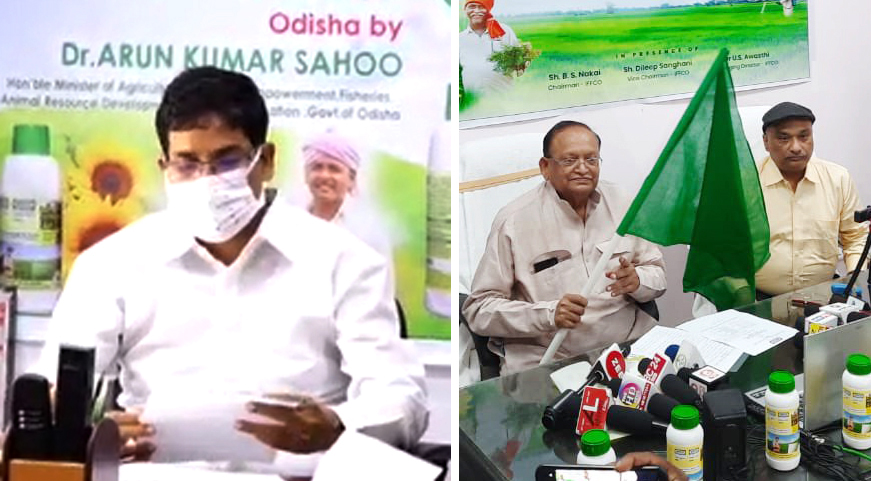It was a hectic day for IFFCO as two eastern states-Bihar and Odisha geared up to receive the magic liquid known as IFFCO Nano Urea Liquid. Truck loads of Nano Urea were flagged off from the Kalol Unit for Bihar and Odisha by the respective Agriculture Ministers- Bihar’s Amrendra Pratap Singh and Odisha’s Dr Arun Kumar Sahoo.
In Bihar, the arrival of IFFCO Nano urea was welcomed not only by the state govt and cooperative leaders but also by the media which splashed stories of the event next morning with catchy headlines.
Bihar Agriculture Minister Amrendra Pratap Singh virtually flagged off the rack of IFFCO Nano Urea from Kalol to Bihar on Thursday. The first batch of Nano urea is slated to reach the district of Bettiah in Bihar.
While Biscomaun Chairman Sunil Kumar Singh was with the Minister, other dignitaries joined the event virtually. IFFCO Vice Chairman Dileepbhai Sanghani, MD Dr U S Awasthi, Director Prem Chand Munshi and
others were connected through technology.
Lauding the efforts of IFFCO, Biscomaun Chairman Sunil Kumar Singh wrote on his Facebook wall, “A new revolution started in the agriculture sector and this is due to the visionary thinking of IFFCO’s MD Dr U S Awasthi. The flagging off program was held at the official residence of the Hon’ble Agriculture Minister, in which he honored me with a Shawl and a bouquet”.
You may not have seen the event but let me tell you that IFFCO’s plan to produce 18 crore bottles of urea in the country would revolutionize the fertilizer scene as never before. Credit goes to the scientists for producing this and most of all to the visionary leadership of IFFCO MD Dr U S Awasthi.
When the Union Agriculture Minister Narendra Singh Tomar has himself confirmed that Nano urea was tested in all the KVKs and on 94 types of plants and it was found quite effective, where remains the doubt, underlined Biscomaun Chairman.
In Bhubaneswar Dr Arun Kumar Sahoo, Minister of Agriculture & Farmers Empowerment virtually flagged off Nano Urea trucks for the farmers in the state. The truck containing Nano Urea (Liquid) was dispatched from the Kalol plant in Gujarat to Bhubaneswar in Odisha.
Suresh Kumar Vashishth Commissioner cum Secretary, Government of Odisha said that the state would help in
Speaking on the occasion, Dr U S Awasthi Managing Director IFFCO said, “We will soon set up Nano Urea (Liquid) and NANO DAP plants and IFFCO Paradip will have the biggest Nano Urea plant.” One half liter of Nano Urea bottle gives equal or better impact when compared to a bag of urea from the effectiveness perspective on crops. Because of its small size it is very convenient to be used by farmers in difficult terrains.
IFFCO had earlier dispatched Nano Urea shipments to Haryana, Himachal Pradesh, Karnataka, Uttar Pradesh and Jammu and Kashmir. The stocks were sold within half an hour. IFFCO is already in the process of constructing its plants at its Kalol unit in Gujarat and also at Aonla and Phulpur in Uttar Pradesh in Phase- I by 2021-22. The total annual production capacity would be initially 14 crore bottles of 500 ml, which will further be raised to 18 Crore.
The Kalol plant is dispatching one truck with 15000 bottles of Nano Urea per day and soon the plant will dispatch 10 trucks every day. The Kalol plant is producing 6750 tonne equivalent of urea per day, which would result in saving Rs 35,000 crore of Government’s subsidy burden and would also help farmers earn additional Rs 35000 crore.
In Phase-II, four more plants will be commissioned by 2022-23, producing another 18 crore bottles. Nano Urea has been tested on over 11000 locations, 94 crops and 20 Indian Council of Agricultural Research (ICAR) institutes and State Agricultural Universities.
